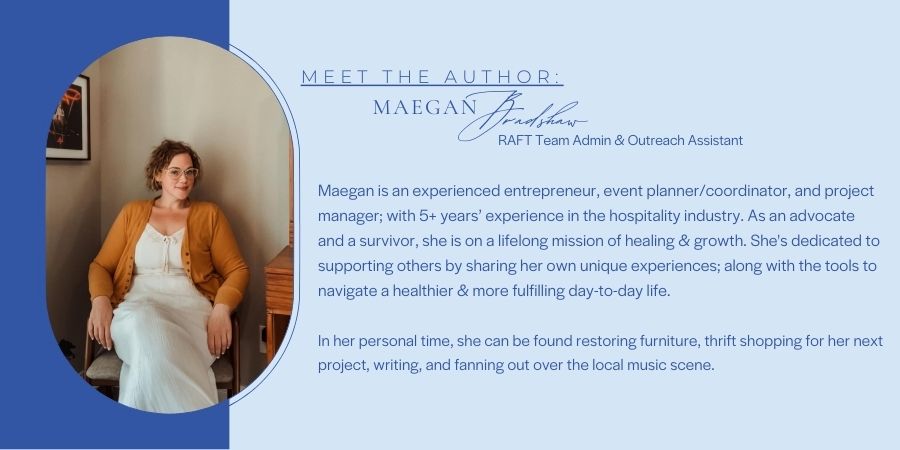Setting Workplace Boundaries as an Advocate
Maegan Bradshaw, June 16, 2023
Advocates, we see your tireless dedication to your cause! We recognize the long work hours in often high-pressure situations; and how committed you are to making a positive change in the world. However, we also know this level of dedication can often lead to burnout, which can be detrimental to both you as an advocate and your cause.
What are boundaries?
Raft defines boundaries as guidelines, rules, or limits created by a person for themselves that are reasonable and safe. These guidelines promote how others treat them and guide how they respond when someone steps outside their personal limits. Statements of what a person will or won't do and/or what they like and don't like.
Boundaries can be physical, emotional, and/or spiritual. For example:
- Physical boundaries might include not working on weekends or not being on call over a certain amount of hours at a time. This could also include not wanting to shake hands or hug others in the workplace.
- Emotional boundaries might include not engaging in toxic/negative conversations or not allowing others to manipulate you into going against your own personal beliefs
- Spiritual boundaries could include setting aside time in your day that is devoted to meditation or prayer with no interruptions; or not participating in conversations that criticize your core values.

Boundaries can also be soft, rigid, spongy, or flexible (according to author Nina Brown.)
- Soft Boundaries are determined by situations and other people. This is when a person allows another to set a boundary and then accepts it as their own.
- Rigid Boundaries are an extreme form of boundary-setting where an individual sets stringent limits and rules around their interactions and relationships with others. Often these boundaries are a response to past trauma or experiences where an individual felt unsafe. While this can make you feel protected, it can also contribute to feelings of isolation and loneliness.
- Spongy Boundaries are a combination of soft and rigid. These boundaries can often be unclear and inconsistent, making it hard to decide what to let in and what to keep out. It's important as a person with a spongy boundary to take the time and space to distinguish your own feelings, thoughts, and needs rather than feeling a responsibility for others' emotions or problems.
- Flexible Boundaries are healthy and adaptable boundaries that allow a person to protect themselves and their values while also being responsive to the needs and feelings of others. These boundaries are considerate of your individual needs; so, you can be assertive when needed but are open to negotiation and discussion.
Why are boundaries important for advocates?
Advocacy work can be emotionally taxing, especially when navigating the sexual and domestic violence field. As advocates, you're often exposed to trauma, suffering, and injustice, which can take a toll on your mental health. Setting workplace boundaries can help advocates manage their emotional well-being, maintain their energy levels, prevent burnout, and avert compassion fatigue.
Boundaries can also help advocates maintain a sense of their personal values and morals. Advocates are immensely passionate about their causes and emotionally invested in their work. No one can choose to stay in this career field without that intensity and dedication. However, to keep advocates that genuinely have the capacity for such important but demanding work, boundaries for oneself are essential to keep that fire from slowly burning out.

How can advocates set boundaries in the workplace?
Boundary setting can be challenging, especially in fast-paced, high-pressure, and demanding workplaces. Here are some of my tips for advocates on how to set boundaries in the workplace:
- Identify your limits: Give yourself the time and mindful space to reflect on what you are comfortable with and what you are not. This could include your working hours, the types of cases you take on, or the amount of time you spend on specific tasks.
- Communicate your boundaries: Once you have identified your limits, communicate them clearly to your colleagues, clients, and leaders. Be respectful but assertive when explaining why you are setting these boundaries.
- Stick to your boundaries: Once you have set your boundaries, it is important to stick to them. I know this can be tough, especially if you are used to working long hours or taking on more than you can handle. However, by respecting your own boundaries, you'll be sending the message to others that your time and energy are valuable; while gaining more stability and control over your life.
- Formulate your response: Knowing how you will respond when a boundary is crossed will increase the chance of you maintaining that boundary. If you don't have a prepared response, it is easier for someone to convince you to change your boundary or make a compromise you are not comfortable with.
- Practice self-care: Setting boundaries is only one part of the equation. Practicing self-care is essential for your physical, emotional, and mental health. Without a doubt, you hear this "self-care" term SO often, and when the world's weight is on your shoulders, it can feel impossible. Yet, we humans are capable of such great things when we establish behaviors that promote holistic well-being. It can be as small as setting the alarm to take your breaks/lunches (and practicing mindfulness in those moments), scheduling dinner with a friend (or canceling dinner plans when you need rest), or saying no to a weekend on call.
The victims of sexual and domestic violence NEED advocates. So, boundary setting is crucial for every advocate to maintain their well-being and effectiveness in their work. By setting boundaries and sticking to them, you can prevent burnout, avoid compassion fatigue, and positively impact the world.
Here at RAFT, we strive to improve the level of care for sexual and domestic violence survivors by providing support to the heart of the agencies, the staff. One way we do this is through workshops; teaching the tools needed to build resilience to compassion fatigue and stressors related to work (like healthy boundary setting.) RAFT provides these workshops free of cost to SV and DV agencies and coalitions! For more information on how RAFT can share these tools and support your organization please email me at outreach@raftcares.org








